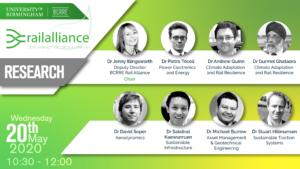Following yesterday’s first session of our 3-day Destination Decarbonisation event, which covered the big-picture of policy, funding, demand for decarbonisation technologies, today’s session was all about research and the BCRRE Centre of Excellence in Rail Decarbonisation.

It was my pleasure to introduce this Centre of Excellence and its six themes encompassing energy, efficiency, infrastructure and resilience, together with my academic colleagues who lead each of the areas.
We heard from Stuart Hillmansen on his work on low-carbon traction systems and efficient use of traction energy; followed by Pietro Tricoli on power electronics and battery charging technologies. Andrew Quinn changed the direction slightly by having us think about resilience and adaptation strategies, particularly in the context of climate change and managing its associated risks; and David Soper introduced his work on aerodynamics and the effects of passing trains on structures and infrastructure. Next up was Sak Kaewunruen who works across topics including sustainable infrastructure using low-carbon materials and digital technologies; and finally Michael Burrow and Gurmel Ghataora, whose work on asset management and intelligent decision-making systems is sought-after around the world.
Fortunately the academics managed (mostly) to keep to time and we were able to squeeze in some questions:
From Louise Shaw (Waxwing Engineering), Edgar Goddard and Noel Dolphin: whether there is a sweet spot between battery capacity, duty cycle and charging times (the short answer is “not yet but we hope so in the future”);
From Noel Dolphin: which batteries have we used on HydroFLEX (a commercially-available lithium-ion battery). We discussed the issues around charging cycles, capacity loss and charging times;
From Ahsen: the Covid-19 disruption and if there is a need to prepare an adaptation strategy (answer is yes, it presents a new challenge above the long-term focus of our research and highlights the importance of operational flexibility e.g. dynamic maintenance scheduling, rostering, locating people and jobs);
From Neil Pointon on looking into the effect of incorrect fitment of spigots, which David will be interested in discussing further via railway@contacts.bham.ac.uk;
From Rebeka at Sellick Rail: which data and sensors/data collection should her company be developing in support of modelling and decision tool development? There is an appetite for up-to-date, real-time, high quality data across track condition, train operating costs, drainage, to name but a few. We noted that a recent project highlighted the need for reliable, effective communication of data from sensors to a point for analysis in real-time (or near real-time).
Questions we didn’t have time for were:
Steve Mills asked us about optimal driving strategies and whether these are configurable/adaptable for disruptions. He also asked Stuart if there are technical challenges for the grid to benefit from regenerative braking when trains are passing.
Philip Haigh asked about likely payback periods for converting existing AC OLE and rolling stock to MVDC.
Martin Little asked about using alternative energy sources and other energy harvesting for powering rail vehicles. He added that Rail Alliance member, FutureMotive, will be presenting its battery technology developments at tomorrow’s Innovation session.
Mark Biddulph of Mann+Hummel asked if there are considerations for cleaning/filtering out contaminants such as NOx and fine dust from the air within the infrastructure.
Chris Poyner of ABB asked whether considerations been made for changing how rolling stock is operated to optimise battery sizing or whether existing operating profiles will continue to be used.
Finally, David Dundas asked about the UK’s strategy for implementing Alstom’s Breeze Hydrogen-powered train available in the UK from 2022, against HydroFLEX.
I was very encouraged to see the many questions which came in during today’s session, which shows there is an appetite for knowing about the latest research and development findings. Tomorrow’s session will be all about making research, development and new ideas into new products and services so please tune in tomorrow for our Destination Decarbonisation Innovation webinar at https://www.railalliance.co.uk/event/destination-decarbonisation/
All of the webinars and answers will be available exclusively on the Rail Alliance website from 26th May.
